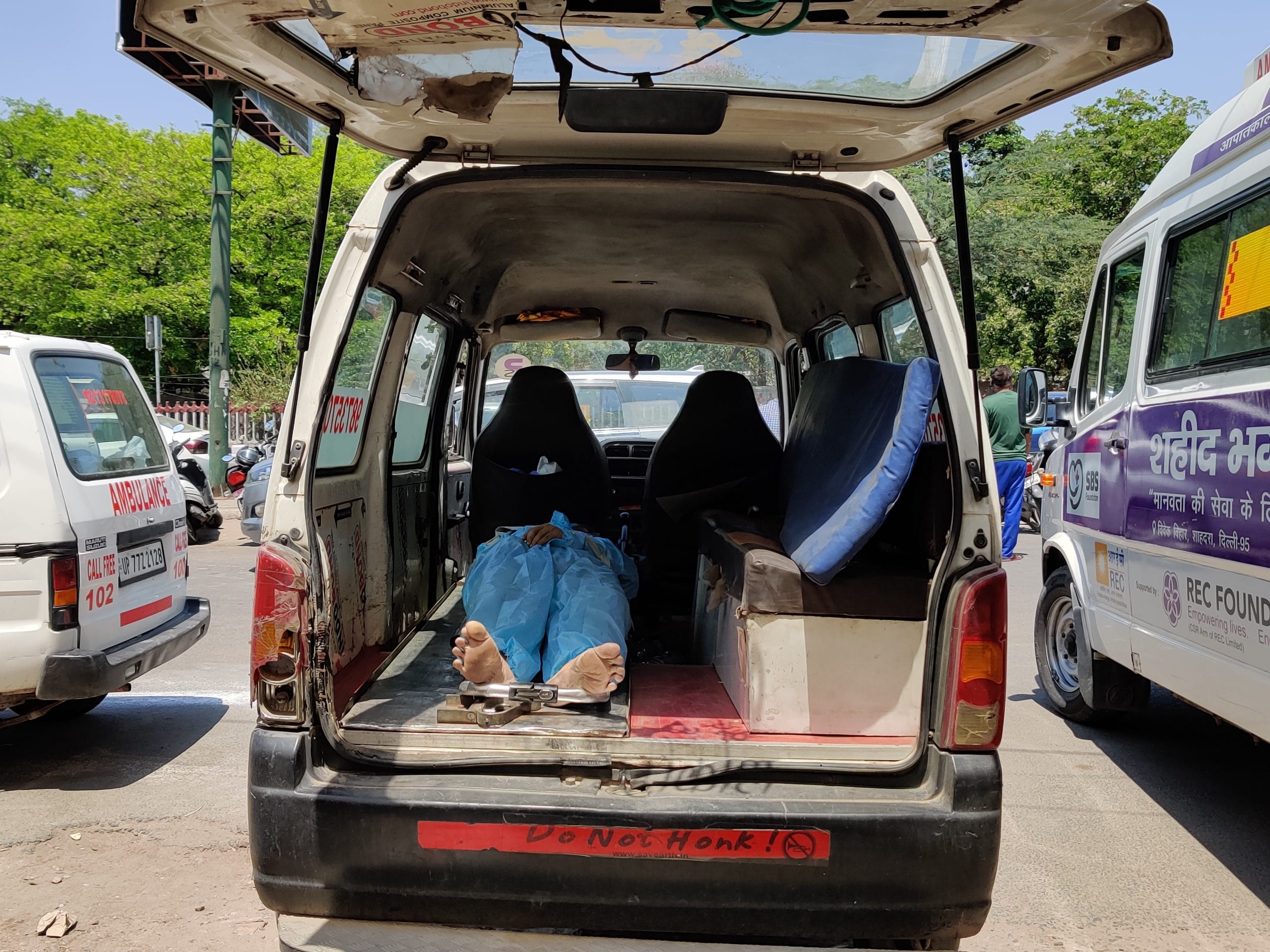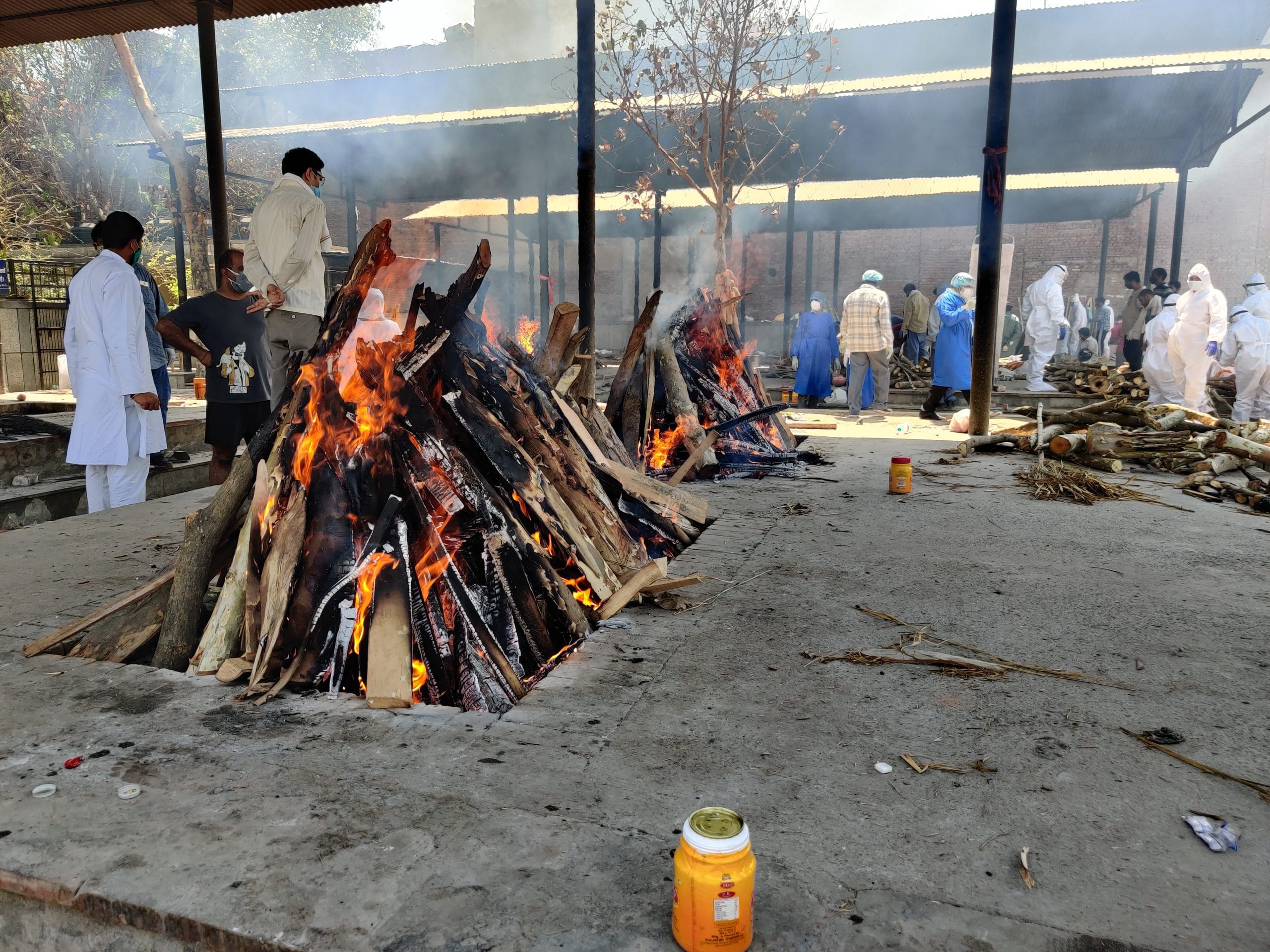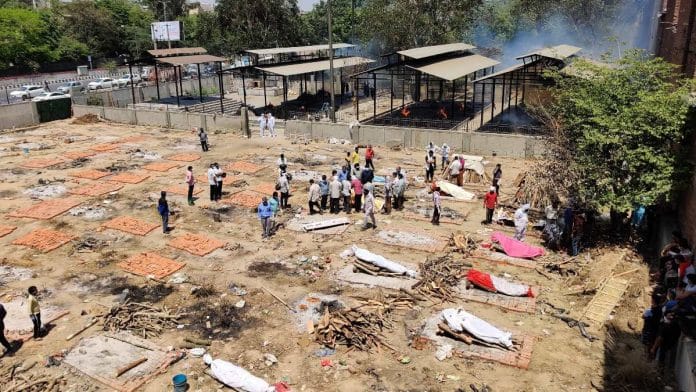New Delhi: The catastrophic second Covid-19 wave ravaging the country has led to a steep surge in deaths of coronavirus patients in Delhi, with crematoria witnessing a huge influx of bodies.
The Old Seemapuri crematorium, for example, has seen a massive daily increase in Covid funerals in the last two months — from 0-1 in February to 86 on 24 April.
Crematory officials said, in February, only 0-1 Covid funerals on an average took place a day, while in March, 1-2 bodies of such patients were cremated.
A fortnight ago, the crematorium performed 13-14 last rites of Covid victims a day, which has now gone up to 32 on 22 April, 52 on 23 April and 86 on 24 April — the highest so far. The total cremations, both Covid and non-Covid, recorded in these three days were 68, 86 and 118, respectively.
The funeral ground originally had space for only 26 pyres, which has now been increased to accommodate 80-90 pyres. It also had to be expanded a fortnight ago to the adjacent parking lot to tackle the surge in cremations.
“We had to expand the crematorium two weeks back to the parking ground due to the increasing number of dead bodies coming in. We can’t send people away, everyone deserves funeral rites,” said a Delhi government official.
The crematorium, a less frequented cremation ground until the second wave, didn’t witness such a massive influx of bodies even during last year’s Covid peak. Crematory officials said during the peak of the first wave last year, the average number of Covid bodies cremated were between 18-21.
Kishan Dhawan, in-charge of the crematorium who has been sitting at his desk outside the main gate from 6 am to 11 pm every day for the last two weeks, said it’s “worse than last year”.
“Never in my life have I ever seen so many bodies… Without Covid, there were hardly 0-3 bodies that came here. Since the last two weeks (the second and third weeks of April), there has been at about 70-75 per cent surge,” Dhawan said.
Last year, only a maximum of 60 quintals (around 6 tonnes) of wood were required per day, which has now surged to 250-300 quintals of wood being used daily, he added.
Delhi reported 357 Covid deaths Saturday, highest since the pandemic broke out a year ago, with 24,103 fresh cases.

Also read: No Covid tests for Kumbh returnees, no beds or data — how 2nd wave has hit Indore, Bhopal
Numbers higher than logbook entries
The number of Covid deaths being registered in the crematorium’s official logbook is based only on Covid-positive reports and, hence, chances are the actual number of Covid deaths is much higher than what is being officially registered.
An ID card of the deceased, a hospital Covid certificate and ID card of a family member are required from those who need space to perform last rites of their close ones.
On these bases, the entries of Covid and non-Covid deaths are maintained. For example, the total number of bodies that came to the crematorium Saturday was 118, of which 32 were registered as non-Covid.
A second Delhi government official, who didn’t want to be named, said the numbers of Covid bodies are more than what’s registered under the ‘Covid death’ column.
“Many people die without getting a chance to test, without being admitted in hospitals. Some had symptoms, but tested negative, others died waiting for reports. Only 1-2 bodies are non-Covid, rest everyone brought here has died from the virus,” said the official.
Jitender Singh Shunty, BJP leader and former Shahadra MLA who runs a non-profit medical service called the Shaheed Bhagat Singh Sewa Dal, echoed similar sentiments.
“Almost all are Covid casualties here, there are so many who don’t have their loved ones to perform funeral rites as they are all positive,” he said.
Shunty’s NGO runs 18 ambulances and helps families cremate Covid patients.
Dressed in a dark yellow turban and protective gear, Shunty sits on a desk throughout the day helping out families with ambulances and making them understand the system at the crematorium.
“The average wait time is 2 hours, please forgive me,” he tells almost every person who walks up to his desk requesting help in speeding up the process.
Each person is provided with a token number on a slip and they wait for their turn to arrive.
“Last year, I helped cremate 10-12 (bodies) on a day, that was the highest, this year, the number just keeps increasing,” he added.
The second wave of the pandemic didn’t just batter the old, but the youth and even children too.
“Last year it was mostly old people, but now I am carrying bodies of children, youths and newlyweds. It is getting worse, I haven’t gone home in 3 weeks, can’t risk the life of my parents, so I am living in a small room with other drivers in Noida,” said Manoj, an ambulance driver.

Also read: N-E Delhi hits ‘new low’, deputes 6 govt teachers to assist in Covid bodies management
‘My life is over’
Inside the crematorium, families stood as pyres of their loved ones burnt, watching it from a distance, wearing masks.
There is non-stop movement of logs being brought to the funeral ground, with sanitation workers working tirelessly to clean up the burnt pyres to pave way for the next body.
Pallavi Bhardwaj, 35, would have got married in November this year, but instead she lay motionless in an ambulance, with her family wailing, and waiting for their turn to perform her last rites at the crematorium Saturday.
Beside the body, sat her 62-year-old mother, Sudha, clutching onto a red saree which she had bought for Pallavi’s wedding.
“My life is over, there is nothing more to live for. She was my spirit, she was born after 7 years of marriage,” Sudha said.
Weeping uncontrollably holding onto a nearby pillar, Sudha was also showing this reporter photos of her daughter laughing, eating and dancing.
“She taught us how to live,” Sudha added.
Pallavi, who worked at a fashion export hub in the national capital, died Friday night at Rajiv Gandhi Super-Specialty Hospital after her oxygen levels dropped. She had all the symptoms of Covid-19, but had tested negative for the virus on 20 April, and was admitted as a presumptive patient.
Even though the hospital handed over the body to her family Saturday morning itself, Pallavi’s family spent hours running from pillar to post to find a crematorium to perform her last rites.
They reached the Seemapuri crematorium at 11 am, only to wait for another two hours before their turn came.
Some families didn’t wait a second before bringing the body to the crematorium as they feared of waiting in line.
Father of 28-year-old Shubham Kapil died in the car while the family moved around Delhi from 3 am to 10 am Saturday. His father, Arun Kumar Kapil (65), collapsed after his oxygen level dropped suddenly.
“I tried very hard to find a bed, but couldn’t get any as he breathed his last, I could only watch helplessly. I directly drove to the crematorium, there was no time to think else we wouldn’t get space,” Shubham said.
Plight of local residents
For the residents of the Sunlight Colony adjacent to the crematorium, it has become almost impossible to survive the stinging smoke billowing out of the crematory everyday.
Families of the colony also no longer allow their children to go up the terrace to play.
“Maut dekhenge bas… aur kya pata dhuan se Covid ho gaya toh? (We are only witnessing deaths, what if we get the virus from the smoke). Bahut bachon ko ho raha hai iss bar (Lot of children are getting affected this time),” said Shamli, a local resident.
(Edited by Debalina Dey)
Also read: Delhi’s cumulative death rate doesn’t give you the full picture of the second wave. Here’s why







Heart breaking.
On the front page of NYT. The cremations never end …